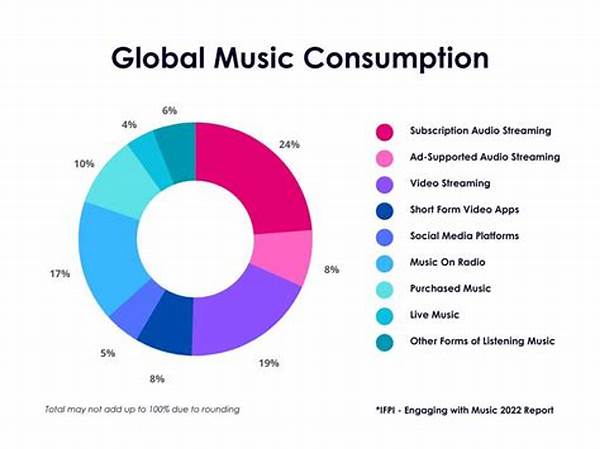The worldwide music scene has experienced seismic shifts over the past few decades, as digital technology annihilated borders and allowed other genres to intermingle. The proliferation of streaming services and social media turbocharged this process, ushering in an era of music globalization and reshaping industry trends. As artists from every corner of the globe gain access to platforms providing worldwide reach, the music industry is undergoing a metamorphosis. Emerging markets are now powerhouses, dictating new trends and influencing global hits. This cultural exchange is not merely a trend but an unstoppable force reshaping the soundscapes of our time.
Read Now : Music For Self-improvement Journeys
The Digital Revolution and Its Impact
The internet changed the game, folks! Music globalization skyrocketed when digital platforms took the wheel. Suddenly, fresh beats from Africa, Asia, or Latin America slid into playlists everywhere. With streaming services dishing out tracks round-the-clock, listeners digested them all. Industry trends shifted towards more diverse, eclectic sounds as music lovers embraced these new auditory feasts. No longer just passive consumers, fans now wield real power. With a few clicks, they hype their faves, lift emerging artists, and influence industry tides like never before. It’s a wild, wild world of sound out there, and we’re all riding the wave.
Social Media’s Role in Music globalization
1. Social media’s wild, folks! Music globalization boomed as fans could share tunes instantly—an industry trend changer.
2. Artists found new ways to connect. Going live? Huge win for music globalization and industry trends!
3. Viral challenges exploded. Trendsetters, meet industry trends—global vibes!
4. Those IG Reels and TikToks? Music globalization’s besties for quick hits.
5. Fan engagement? Chatting directly shifted industry trends, no doubt.
Streaming: The New Kingpin
The realm of streaming services ushered in a new era for music globalization. Suddenly, niche genres and underground artists had a platform with the kind of reach previously unattainable. Listeners across the globe could explore music from far-off lands, crafting personal playlists that sampled the world’s soundscape. This unprecedented level of accessibility revolutionized industry trends. No longer tethered to local scenes or reliant on traditional radio airwaves, artists gained autonomy over their distribution channels. The music industry, in turn, noted these shifts, adapting by scouting global talent and fostering cross-cultural collaborations to keep pace with rapidly evolving consumer preferences.
Read Now : Innovative Genre-blending Art Practices
The economic implications are just as compelling. The revenue pie, long dominated by a few major players, is being re-divided as streaming royalties are attracting artists away from once-coveted record deals. Meanwhile, listeners revel in the sheer variety at their fingertips, influencing industry trends by driving demand for authentic, diverse sounds. These days, the power balance skews towards artists and fans: a direct result of music globalization facilitated by streaming giants.
The Evolution of Genre Trends
As globalization reshaped the music map, genre trends went haywire. Instead of sticking to label-defined boxes, artists bravely mixed influences. Rap with k-pop? Check. Afrobeat blended with electronic? You bet. Music lovers got hooked on these fresh concoctions, putting pressure on the industry. Keeping up with these kaleidoscopic genre shifts became a top priority for record labels. Industry trends were impacted by this fusion, influencing everything from marketing strategies to production methods. What took place wasn’t just the birth of new genres, but an outright reimagining of what music could be. Fans craving innovation now have endless soundtracks to explore, with artists riding the waves of creativity.
Cultural Exchange Through Music
Music globalization made the world way smaller. Artists from anywhere can vibe together, spawning sick collabs. Fans from LA to Lagos dance to the same jams, creating powerful bridges that transcend any language barriers. Dialogue in the music industry has become more vibrant, with trends morphing as styles blend. This cultural dialogue—spurred by music globalization—brings diverse stories to the fore, enriching listeners’ experiences. As social issues crop up globally, music becomes a platform for conversation. Genres that once faced regional barriers have flooded the mainstream, proving the universal language of beats. What a time to be alive!
Artists Navigating Industry Trends
Musicians are hustling, savvy to shifts in music globalization and industry trends. Want to blow up? Adapt or risk falling behind. Independent artists bypass traditional gatekeepers, using platforms to craft their pathways. Industry trends reward those who relate to the vibes, moving with fans’ tastes. Challenging the status quo has its perks. Crowd-funded albums, direct fan interactions, and creative control mean artists aren’t merely players in the music game—they write the story.
Summary
The music world, once contained within geographical and cultural confines, now operates without boundaries. With music globalization, sounds from across the globe find audiences through the flick of a screen. Industry trends shifted dramatically; the music map is more inclusive, vibrant, and diverse. Artists have more tools to connect with international crowds, breaking free from traditional industry constraints. Music globalization doesn’t simply change what we listen to—it alters how music is conceived, shared, consumed, and celebrated. Those keeping up with these dynamic shifts aren’t just observers; they’re part of the movement that’s reshaping our global sonic landscape, one track at a time.
